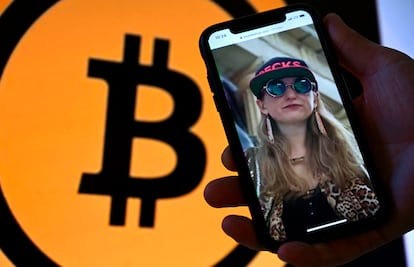How did an influencer and a rapper steal $70 million in Bitcoin?
Ilya Lichtenstein and Heather Morgan showed off their elite lifestyle on social media… until the FBI came knocking at their door

Ilya Lichtenstein and Heather Morgan could have been in a Netflix series: a rapper and a YouTuber, they became the world’s richest thieves, sharing their insane lifestyles on social media while the FBI closed in on them.
Almost everything about this pair of digital buccaneers is very otherworldly. Vanity Fair just published a complete chronicle of their adventures, making it clear that the rise of cryptocurrencies has created a new kind of white-collar criminal.
The crime of the century
In August of 2016, Morgan and Lichtenstein came into a huge amount of money that did not belong to them. It’s not easy to determine specifically how much, because the loot was in cryptocurrencies, whose value in solid money has fluctuated dramatically over the last half-decade. However, given that the loot was 119,754 bitcoins, at one point it may have been worth about $70 million.
These bitcoins were stolen during a hack of Bitfinex, an online financial platform. The coordinated assault lasted four hours, with the hackers seizing half of the available funds. It is not clear who perpetrated the crime, but most of the stolen cryptocurrencies went into a digital wallet under the control of Lichtenstein.
For years, the digital money stood still, while its price continued to rise or fall at a frantic pace. Finally, in 2021, it began to skyrocket. Lichtenstein initiated a series of illicit transactions to launder the funds and transfer them to accounts controlled by him and his partner. In total, 25,000 bitcoins were put through a complex computerized money-laundering process, so that they could be cleaned and spent beyond the sight of law enforcement.
But the trail never really went cold. The FBI’s cybercrime unit went into action as soon as the stolen bitcoins were detected. In the summer of 2021, a group of federal agents requested permission to access the roof of 75 Wall Street in Manhattan, an imposing 42-story skyscraper. They identified themselves to the doorman of the building and assured him that they were investigating a possible case of child pornography, for which they needed to monitor all apartments.
The doorman asked if they were sure that they had the correct address: Number 95 on the same street was a building frequented by gangsters and cocaine traffickers – the body of an escort had been found there just a few weeks earlier. 75 Wall Street, on the other hand, was a respectable building, with apartments and lofts priced at around $7 million each. But the agents had no doubts. Using the pretext of searching for child pornography, they kept coming back to the building again and again until the end of 2021.
Livin’ la vida loca
What was the criminal couple doing in the meantime? Lichtenstein, 34, an American of Russian origin pretending to be Dutch, was giving online advice about tech and finance. He also had a YouTube channel, where he acted as an amateur magician and mentalist. Morgan, a 31-year-old Californian – known as “Razzlekhan” to her followers – constantly updated her own YouTube channel, where she appeared rapping through the streets of New York, dressed as a pimp or Little Red Riding Hood.
The two maintained very intense online activity. They were narcissistic and frivolous, constantly boasting about an increasingly opulent lifestyle that seemed to have no clear source of income. Their most popular page was an Instagram profile dedicated to their Bengal cat. And, despite everything, they went unnoticed, because exhibitionism is not expected in those who have something to hide.
Federal agents were baffled by the very particular type of criminal they were dealing with. As Nick Bilton – the author of the Vanity Fair article on the couple – explains, “most massive cryptocurrency thefts go unpunished, because they are not committed by teenage hackers who spend hours in their parents’ garage, but by criminal syndicates sponsored by regimes like North Korea or Iran.” The fruit of their misdeeds is spent on “buying illegal weapons on the dark web or financing terrorist groups such as the Islamic State.”
Computer crime units can often track dirty money through sophisticated artificial intelligence systems… but the criminals are almost always safe, in places that will never agree to extradite them. The novelty in this case is that the suspects in one of the biggest cryptocurrency thefts in history were two young entrepreneurs – with no apparent criminal connections – living in the middle of New York City, laundering money by the handful with the same computers used to rob Bitfinex.
Thomas Barrabi, a business reporter at the New York Post, describes Lichtenstein and Morgan as “a couple of eccentric thirtysomethings with Peter Pan syndrome and criminal genius.” Either they were too clever, or they “turned out to be rather dumb.”
The couple entertained the possibility of disappearing from the map. They held fake passports and it appears that they were considering settling in Russia or Ukraine, laundering the money from there and never returning to the United States. Given the amount of ill-gotten gains they had in their possession, it would have been a sensible move. However, sometime in 2021, they changed their minds. They decided not only to stay, but also to get married in a lavish wedding. They had a raucous ceremony in Culver City, California, with hundreds of guests and groomsmen dressed up as bananas. After the wedding, a private bus took the entire group to an exclusive mansion in the town of Westlake Village, near Los Angeles. It was, according to attendees, a party as strange as it was epic.
The FBI vs. Lichtenstein and Morgan
Back in New York, the newlyweds would soon be in for an unpleasant surprise. In January 2022, the FBI already had multiple pieces of evidence against them and broke into their apartment with a search warrant. Around $40,000 in cash and 50 electronic devices were seized.
In the weeks following the search, the rapper and guru continued living their lives, more present than ever on social media. If the federal investigation made them nervous, they didn’t show it. Even though they still had their passports, they didn’t attempt to flee. Either they didn’t fully realize the mess they were in, or they had already lost hope and opted to enjoy their last days of freedom. They were arrested in February of this year, accused of money laundering. In the absence of a smoking gun linking them beyond reasonable doubt to the 2016 Bitfinex heist, they have been charged as accomplices.
Morgan is now out on bail. She’s been reunited with her cat, but avoids social media and has stopped rapping. Lichtenstein has spent the past few months behind bars. Both are negotiating with the government, hoping to reduce their sentences in exchange for clarifying how one of the most lucrative Bitcoin thefts in history took place.
Tu suscripción se está usando en otro dispositivo
¿Quieres añadir otro usuario a tu suscripción?
Si continúas leyendo en este dispositivo, no se podrá leer en el otro.
FlechaTu suscripción se está usando en otro dispositivo y solo puedes acceder a EL PAÍS desde un dispositivo a la vez.
Si quieres compartir tu cuenta, cambia tu suscripción a la modalidad Premium, así podrás añadir otro usuario. Cada uno accederá con su propia cuenta de email, lo que os permitirá personalizar vuestra experiencia en EL PAÍS.
¿Tienes una suscripción de empresa? Accede aquí para contratar más cuentas.
En el caso de no saber quién está usando tu cuenta, te recomendamos cambiar tu contraseña aquí.
Si decides continuar compartiendo tu cuenta, este mensaje se mostrará en tu dispositivo y en el de la otra persona que está usando tu cuenta de forma indefinida, afectando a tu experiencia de lectura. Puedes consultar aquí los términos y condiciones de la suscripción digital.









































